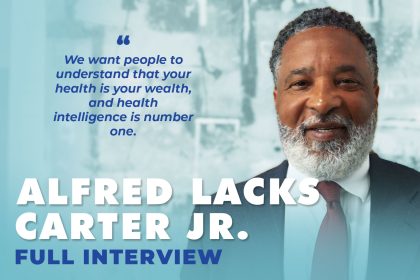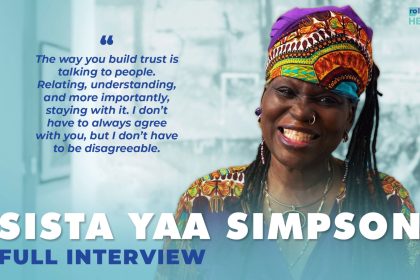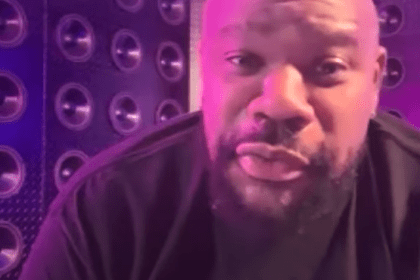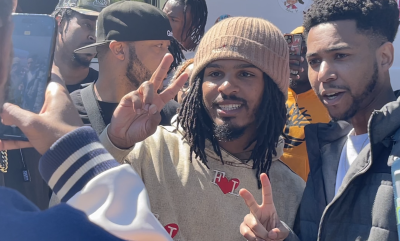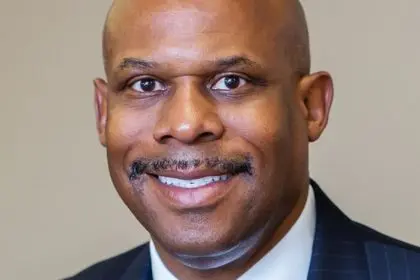In the crowded landscape of social media platforms, Isaac Hayes III stands apart with a vision that extends far beyond likes and shares. As the founder and CEO of Fanbase, the first microcast subscription social media app, Hayes is tackling a problem that has long plagued digital creators: fair monetization of content, particularly for Black creators who have historically powered social media’s explosive growth without equitable compensation.
Born in Atlanta and carrying forward the legacy of his iconic father, Isaac Hayes, the younger Hayes has charted his own path in tech entrepreneurship. Having raised an unprecedented $6 million in seed funding through StartEngine—making him the first Black man to achieve this milestone in a Reg CF campaign—Hayes has grown Fanbase to a $50 million valuation. But his mission transcends mere numbers.
In this candid conversation with Munson Steed, Hayes shares his journey from music industry veteran to tech innovator, revealing how his mid-forties pivot into technology was driven by a clear purpose: to create an equitable digital landscape where creators directly monetize their content without algorithmic barriers. As social media evolves into what Hayes describes as “the new television,” his platform stands ready to reshape how we think about content creation, consumption, and compensation in the AI-driven future of 2025 and beyond.
[Editor’s note: This is a truncated transcribe of a longer video interview. Please see the video for the extended version. Some errors may occur.]
What is Fanbase, and what inspired its creation?
It was about 2018, and I just saw that Black culture was really elevating social media to a point that these companies were becoming worth hundreds of billions of dollars when we didn’t have any equity in the companies. But also, it was hard for us to monetize based on algorithms and advertising, the way these companies are set up, that allow other creators to make a lot of money, but not necessarily Black culture. So, I feel like we needed something that leveled the playing field, allowed direct-to-consumer monetization, and gave everybody a shot at monetizing their content.
What advice would you give to future CEOs at institutions like Howard, FAMU, or Morehouse?
Well, the first thing I would say is give yourself time to grow into whatever idea or purpose you have. I didn’t found this company until my mid-forties and so it really gave me time to find a passion I was duly passionate about—music—and then moving into the tech space.
So, you got time to grow, but you got to prepare yourself to give yourself the opportunity for that growth, and that is really working hard while you’re young. Like, while you’re young—you know, I really wasn’t much of a partier. I worked hard as a kid so I could play hard as an adult. While you have the energy to stay up until four or five in the morning for a week straight, use that time to build something or a set of skills that can propel you forward.
How should Black people view their relationship with technology?
Oh, as a leveraging opportunity because a lot of this tech, depending especially on social media entertainment, doesn’t really work without us. We are the energy, we are the power source for a lot of these things. Black people have an enormous amount of gifts and talents, but one thing that we lack is building infrastructure. Technology gives us the opportunity to build virtual infrastructure that we can use to our advantage and actually monetize and own and scale to billion-dollar corporations.
What lessons can you share about raising money for a tech company?
I think I spent probably a good year learning about the tech industry before I even built Fanbase, just understanding the landscape, and then probably an additional six to seven months understanding how to navigate that field, who were the players in that space, what roles needed to be filled—all these things.
So, I did my homework, and then I prepared my company for success by making sure that I had a stock structure that was advantageous to me moving down the road. Trademarking your ideas, patenting your ideas, things like that. Because you can have a great idea, but if you move and then don’t cover your basis, you could be in a situation where someone can take your idea.
What has been your experience building a team as CEO?
It’s been fun, but very challenging. What I consider myself is a visionary. I’m a big idea guy, but I have an integrator in my company as my COO and CTO who can implement those ideas with structure. My job as a CEO is to build a team that’s smarter than I am, right, that can implement my vision and execute better than I could.
I always say hire slow and fire fast. So, take your time looking for the right person—you don’t rush. But if it’s not working out, fire them right away. Find somebody else to get in there and do that, and usually, that helps because you really don’t waste time.
How do you approach AI as a tech leader?
Well, AI is not going anywhere, so to be someone that resists it, you’re just preventing the inevitable, right? I’ve been leaning so heavy into AI, but I would say, number one, embrace it. Two, lean into it. Don’t even dip your toe in the water; jump all the way into these programs because you will start to see things and realize exactly the magnitude of what AI has.
There’s a lot of brainstorming that you can use AI for. It saves me time crafting messaging or emails, and on the creative side, my goodness, it just allows you to manifest things you never would have really been able to do so fast. I say this: photos are out of here in 2025. I think you will be able to render a photo of yourself in any way, shape, or form, that’s just a static image.
What role does imagination play for you as a CEO?
It’s the most critical part of what I do because it’s the vision beyond what people can see. The visionaries are the ones, the people that we talk about. We talk about Steve Jobs, Mark Zuckerberg, Daniel Ek. Like, you think about Spotify. He was like, “No, this MP3 thing and CD thing is not it; it’s streaming.”
And I’ll say this – nobody’s going to believe in you until you are success. Even your closest friends, people that you think you know, until they see you on a level that they respect and understand, 99% of people are not going to support you. A lot of times you’re seeing things that people can’t see, and belief is a powerful influence.
Why is it important for you to remain curious as a CEO?
Because it gives you an opportunity to ask the who, what, when, where, why of what you’re doing. And then curiosity allows you to challenge thought that sometimes has just been created by another human being that we take as gospel. Most of these practices and customs and traditions are just things made up by other people, right?
When you challenge that, curiosity allows you to challenge things that most people just simply go along with the flow. And then you have a perspective and a vision that allows you to see way past where everybody is going.
You’re part of a legacy, but at the same time, you’ve created a legacy for Fanbase. How do you view this?
The preservation of a legacy is extremely important because it’s something we didn’t always have control over. The opportunity to maintain my father’s legacy through ownership and control of his name, image, and likeness, his music—that’s extremely important because those things were exploited by other people for years.
What I want my little brother to see is that you don’t have to be our father to be successful. I never want him to feel that pressure. What I will say, though, is that I take from my father his work ethic, his imagination, his passion, and I apply that to what I do.
What industries do you monitor for insights to influence your thinking?
The music industry, first and foremost. It taught me the value of ownership. The VCs are like the labels—they’re the A&Rs of the tech industry. My company Fanbase, the startup, is the artist. I’m an independent artist. I’ve been able to raise $13 million outside the venture space without their help.
And then from tech pioneers like Steve Jobs and Zuckerberg. Jobs got voted out of Apple, so Zuckerberg created two classes of stock when he built Facebook—voting and non-voting. That’s what I did with Fanbase. I have all the voting control in the company because everybody doesn’t have your best interest in mind.
Just in case you’re wondering how to get and invest, Isaac, give us a word.
Invest in Fanbase. What’s special about that is I’ve raised $13 million in equity crowdfunding, right? And that’s the ability for you to have equity in a pre-IPO company, which is unheard of. Most people that invest in these tech startups are already rich people that get together in a room, put $50,000, $100,000, $200,000 into something, and it scales to billions of dollars. Well, I wanted to offer that opportunity to people that make Fanbase what it is—the community of people that use the app.
The minimum to invest in Fanbase is $399, which is incredible because it allows you to sit on the cap table of the company with 60 shares of stock. Go to startengine.com/fanbase and invest, become an owner, and download Fanbase. I really think just given the current environment that we’re in, that there are some big opportunities for this app. The social media landscape is about to really shake up in the next 60 to 90 days. I think it’s going to be an entirely different place by February or March of 2025. So, I would say stay tuned, but it’s the right time to invest in Fanbase.

